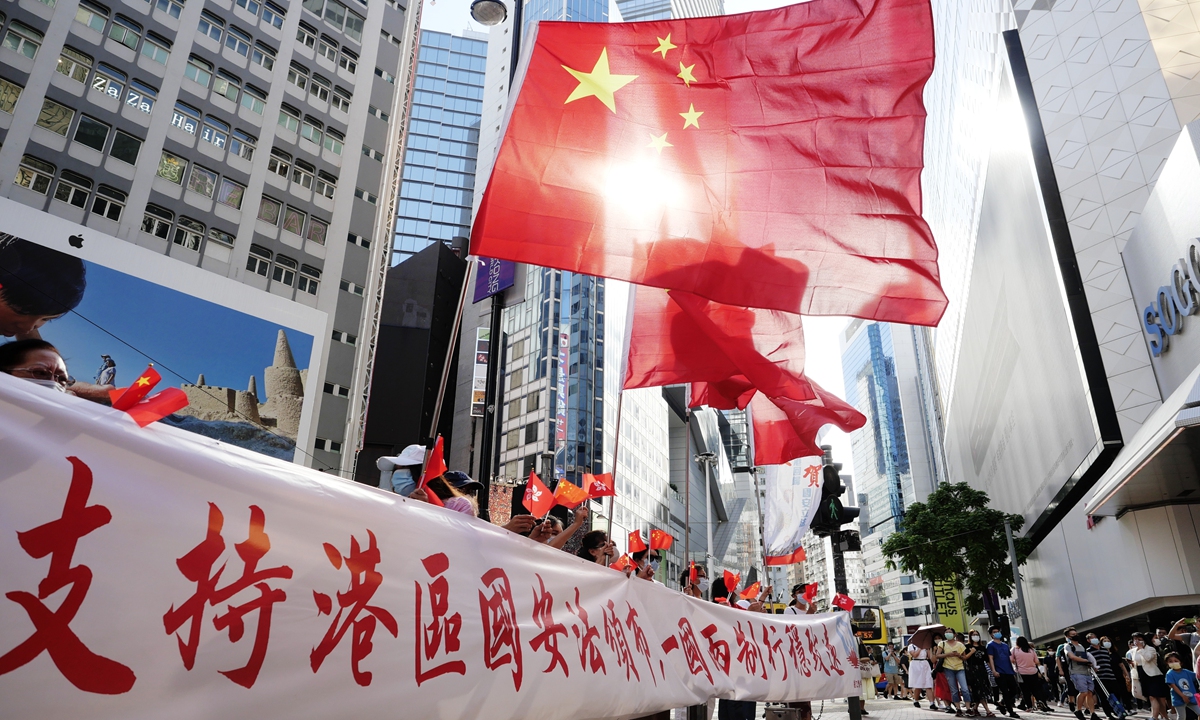France risks becoming a fugitive haven by halting extradition treaty with HK: experts
By Wang Qi Source: Global Times Published: 2020/8/4 20:42:43

A group of Hong Kong residents celebrate the passage of the national security law for Hong Kong and mark the 23rd anniversary of Hong Kong returning to China in Causeway Bay on Tuesday. Photo: Xinhua
France risked becoming a fugitive haven for desperados after it announced on Monday a halt to the 2017 extradition treaty with the Hong Kong Special Administrative Region (HKSAR), experts said.
The French foreign ministry said the decision was made in the wake of China's national security law for the HKSAR, which they believe violates "one country, two systems" and "fundamental freedoms" and affects French people and firms.
China is firmly opposed to France's false remarks and measures on Hong Kong that interfere in China's internal affairs, Wang Wenbin, spokesperson of China's Ministry of Foreign Affairs, said on Tuesday.
The national security law for the HKSAR is in line with the principle of "one country, two systems" and also ensures the stable and long-term development of the principle. The allegation that Hong Kong's high degree of autonomy and fundamental freedoms are undermined is untenable, Wang said.
As of April 22, HKSAR had signed extradition treaties with 19 countries. Analysts believe there is no evidence for France to blame the national security legislation for Hong Kong, and its move was more out of political purposes.
Cui Hongjian, director of EU studies at the China Institute of International Studies in Beijing, told the Global Times on Tuesday that the suspension of the extradition agreement with Hong Kong panders to the US, which could affect the political mutual trust between China and France.
Signed in 2017, the treaty between France and HKSAR had yet to be implemented before its suspension.
Nevertheless, analysts pointed out that the suspension of the extradition treaty will inevitably affect the judicial cooperation between China and the European countries.
France's move came after Canada, Australia, the UK, New Zeeland and Germany suspended their extradition agreements with Hong Kong.
Cui added that the coronavirus epidemic has reduced European confidence in their political system, and different domestic voices are growing, so they have become more vigilant toward countries with a different political system that performed well against the virus.
However, unlike the Five Eyes intelligence alliance countries, France and Germany will not blindly follow the US against China in terms of economy, trade and personnel exchanges, except for diplomatic statements and the termination of judicial cooperation with HK politically, some observers said.
"Considering their relations with China, European countries try to limit their response to Hong Kong affairs, and keep a distance from the US and the UK," said Cui, noting that Germany's decision came after the postponement of legislative elections due to a spike in the virus, while France said the national security law for HKSAR "affects our citizens and our businesses."
China is France's largest trading partner in Asia, and has been Germany's largest trading partner since 2016.
Newspaper headline: France panders to US by halting HK legal ties: expert
RELATED ARTICLES:
Posted in: DIPLOMACY